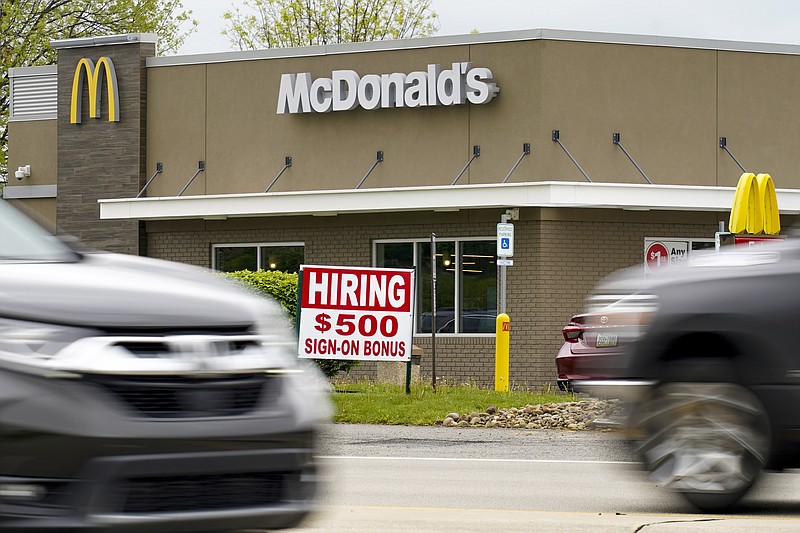You can't miss the "Help Wanted" and "Now Hiring" signs because they're everywhere.
A Fort Oglethorpe clothing store even took out a half-page ad in this newspaper recently seeking employees. Part-time and full-time positions are available immediately, it said, and various positions pay $10 and $12 an hour.
A sandwich chain restaurant we visited recently had a sign imploring customers to be patient with employees trying to prepare their food because the franchise had been unable to hire enough people to staff the location. And, by the way, it told those reading the sign, if you know anyone who'd love to join our team, please contact us immediately.
But many of those people who might ordinarily work for the clothing store or the restaurant are earning more staying at home. In addition to state employment benefits, they've also been getting $300 additional per week from the federal COVID-19 relief package passed in March.
With jobs rebounding and shots rapidly going in as many arms of people who want them, the extra federal benefits were unnecessary for most workers. But it was another way for the Democratic president and Congress to keep a tether on voters.
But after Friday's federal jobs report that was so woefully disappointing, several Republican state governors - Tennessee's Bill Lee among them - had had enough. They are pulling the plug on the extra benefits, as is their right, to get people back to work.
"We will no longer participate in federal pandemic unemployment programs because Tennesseans have access to more than 250,000 jobs (www.Jobs4TN.gov) in our state," Lee said in a statement. "Families, businesses and our economy thrive when we focus on meaningful employment and move on from short-term, federal fixes."
Tennessee's extra benefits will end on July 3, later than most states stopping them.
With Lee's notification to the U.S. Department of Labor, he became the ninth governor in recent days to signal the end of such benefits. It was the right move for him to make.
Objections by Democrats in the various states - over COVID-19 fears, mothers needing to stay at home with school children and the right kind of jobs not being available - have sounded particularly hollow.
(READ MORE: Georgia to end extra federal supplements for jobless benefits next month)
After all, vaccinations for the virus are available to almost every adult in almost every state, schools in at least half the U.S. (and a large majority in the South) are open for in-person learning, and employers are offering jobs at well above the minimum wage of $7.25 an hour (as the jobs report noted wages rising).
The White House and its economists had expected upwards of a million new jobs in April after March's report exceeded expectations with 916,000 jobs, but payrolls grew by just 266,000 workers and unemployment ticked up.
Nick Bunker, economic research director for North America at the Indeed Hiring Lab, put it this way: "This might be one of the most disappointing jobs reports of all time."
Justin Wolfers, an economist at the University of Michigan, added this: "This is a big miss that changes how we think about the recovery."
Adding to the bad news is that the March numbers were revised down by 146,000.
The Biden administration stuck to the party line that the extra benefits, which are available to states until Sept. 6, were needed.
President Joe Biden said he didn't "see much evidence" the benefits were deterring people from taking jobs, and Secretary of Commerce Gina Raimondo claimed "there's nothing in the data which would suggest that that's the reason people are out of work."
However, several days after the jobs report, the White House quietly released a fact sheet reminding people that "anyone receiving UI (unemployment insurance) who is offered a suitable job must take it or lose their UI benefits."
Biden knows he is not on solid ground making the claim about the extra benefits, but the bizarre heart of the matter is if were to promote more people returning to work, their contributions would stimulate the economy even more and generate more tax money for other projects the president has in mind.
Back in Tennessee, extra benefits or not, people who receive state unemployment benefits must complete three weekly job searches in order to remain eligible. They also can take advantage of career specialists at more than 80 American Job Centers across the state who can match them with employment opportunities or connect them with training or apprenticeship programs if they choose to change their career pathway.
Or, after the extra benefits run out, they can take one of those jobs that has gone unfilled - the country had a record number of jobs available in March - and have the opportunity to make far more than their state unemployment benefits could ever pay them.
